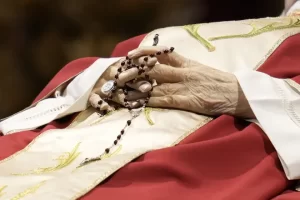Archive, Articles
Tributes to Benedict XVI
These two brief texts were requested by www.ewtn.no and www.katolsk.no for the day of Benedict XVI’s death and that of his funeral.
31 December 2022
It was Sr Pauline Bürling, a Dominican, who urged me years ago to read Joseph Ratzinger’s Introduction to Christianity. That was one of the most beneficial counsels I’ve ever received. The book allowed me to encounter a new theological universe: learned, but hospitable; rooted in a bi-millennial tradition, yet astonishingly contemporary; the style marked by an elegance I’d spontaneously call musical. That there was someone who thought, wrote, and communicated like that was a revelation to me.
Ratzinger’s learning spanned an enormous field – to the benefit of all Christendom when, after the papal election in 2005, he became Benedict XVI. His encyclical letters about hope and love will be still be read in a thousand years, if the world still exists by then. His books about Jesus evidence a profoundly personal, characteristic approach to theology, at the same time intellectual and existential. The Spirit of the Liturgy will remain a crucial reference long after many contemporary quarrels have been forgotten.
Benedict XVI was not confined to an ivory tower. The fact that he was, by temperament, reserved, did not detach him from the world. On the contrary: he was intimately acquainted with the experiences, hopes, desires, and pains of human beings. He was a gentle man. At the same time he entertained no illusions about the potential of people (including believing people) for deceit and infidelity. His meditations for the Stations of the Cross on Good Friday in 2005, in which he named the filth that contaminates the Church from within, voiced his lucidity regarding the abuse scandals that cast such a dark, dank shadow over the last several decades of the Church’s life.
Nonetheless Benedict XVI embodied to the last a radiant hope marked by joy. He confessed by pondered conviction and personal experience God’s victory over sin and death in Jesus Christ. He, born on Holy Saturday, had once for all anchored his life in the power of Jesus’s passion, death, and resurrection. Anyone who has seen him celebrate the sacred mysteries knows how really present this power was for him.
Thus he could convey it to others in his priestly ministry, his teaching, and his pleasant, peaceful manner. Archbishop Gänswein, who probably knew him better than anyone, has said that ‘he never lost his calm. No, the greater challenges were, the more peaceful he became. This had a good, beneficent effect on people around him.’ The peace he carried was a peace the world cannot give.
Like countless others, I shall miss his presence among us terribly. That presence has since his abdication in 2013 been characterised by contemplative stillness; but it was simply good to know that he was there.
Yet I rejoice that he, a faithful and tireless servant in the Lord’s vineyard, has now returned to our heavenly Father’s house. We owe him much. Let us pray for him with reverent gratitude.
May he rest in peace and rise in glory!

5 January 2023
His Holiness Benedict XVI died on New Year’s Eve, the feast of St Sylvester, who was bishop of Rome while the Council of Nicaea took place, during a period in which the Church was subject to great tensions. There has been no lack of tension in Benedict’s own time. Often he has stood in the eye of the storm, encountering much opposition. He must have been, first as Cardinal Ratzinger, then as pope, one of the most fatuously caricatured public figures of modern times.
In the last few days, one has had, though, the sense that a veil has been drawn aside at last, thank God, deflating the world’s adolescent need deafly to oppose what Benedict stood for. We see the clear lines that defined this remarkable life. We see the enormous intellectual and cultural legacy he has left. We see his radical, heroic faithfulness. And we see how greatly he was loved. A friend in Rome wrote to me yesterday: ‘These are beautiful days here – so many signs of great love for the old pope.’
In his spiritual testament, an essential text, Benedict gives voice to his own love for all those ‘who had been entrusted to [his] care’, that is, for us all.
‘In the evening of our life’, wrote St John of the Cross, ‘we shall be judged on love alone.’ It is as if we now see this faithful servant of the Lord and his Church illumined by love — he who was such a strikingly courteous man.
‘Stand firm in the faith’, Benedict XVI urges us in his testament, ‘and do not let yourselves be confounded’. What is simply transitory — polemic, sin, empty hypotheses — will pass; what is essential remains. ‘Jesus Christ is the way, the truth and the life, ‘and the Church, with all her shortcomings, is in truth his body.’ This is the confession in which the text culminates. Let us make that confession our own. And let us, with the Church’s own words, pray thankfully for one who has given us so much:
May Christ who called you welcome you; may the angels lead you to Abraham’s bosom. Grant him, Lord eternal rest, let perpetual light shine upon him
— and let us be enlightened and warmed still by the light he carried. Amen.
